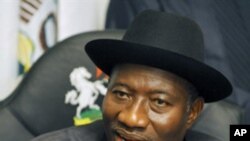New religious clashes broke out in central Nigeria Sunday, two days after bombings that killed 32 people in the city of Jos.
Authorities in Nigeria's volatile Middle Belt region are trying to contain tensions after clashes broke out between armed Christian and Muslim groups in Jos.
News agencies quoted witnesses as reporting that buildings were set on fire in Jos. Security forces were patrolling the area to contain the violence and disperse crowds.
On Friday, a series of explosions in Jos killed 32 people and wounded 74. Many of the victims were doing last-minute Christmas shopping.
Jos is the capital of Plateau State in Nigeria's volatile Middle Belt, a region where the mostly Muslim north meets the mainly Christian south.
Clashes between religious and ethnic groups have killed hundreds of people in and around Jos in recent years.
Plateau state governor Jonah David Jang said the attacks were aimed at sparking violence between Christians and Muslims that would interfere with preparations for April's presidential poll.
"We are going to comb every nook and corner of this city and ensure that these people are fished out and they are dealt with according to the laws of this nation," Jang said.
Nigeria's army chief said the explosions amounted to terrorism.
On Sunday, Pope Benedict XVI condemned the attacks on Christians.
Nigerian President Goodluck Jonathan pledged Saturday to hunt down those responsible for Friday's bombings.
The violence comes at a difficult time for Nigeria, as the country struggles to organize a presidential poll in April. Previous elections have been undermined by ballot fraud, violence and intimidation.
Current president Jonathan is trying to solidify national support before next month's ruling party primary.
His candidacy is made controversial by an unwritten north-south power-sharing agreement in the country's ruling PDP party that says the presidency should go to a northerner this term.
Mr. Jonathan is from the south and only became president after the death earlier this year of president Umaru Yar'Adua, a northern Muslim for whom Mr. Jonathan served as vice president.




